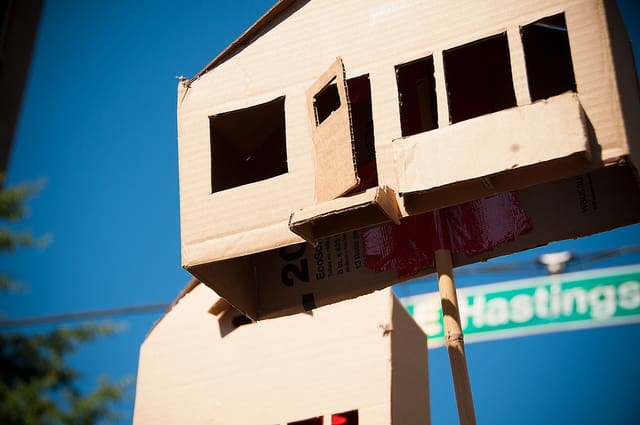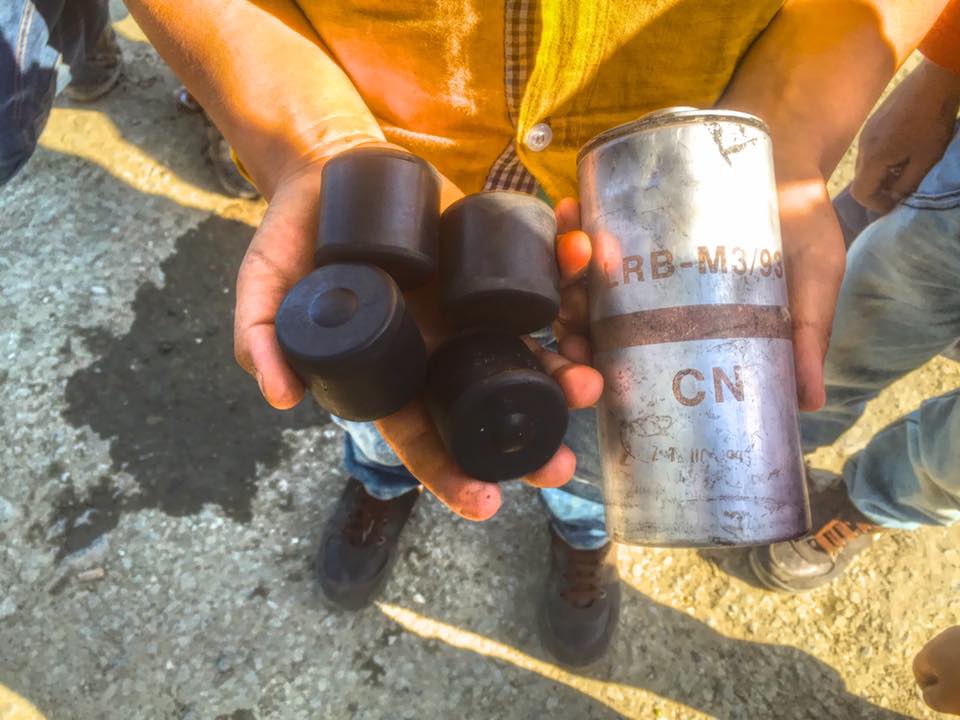Transcribed from the 12 January 2019 episode of This is Hell! Radio (Chicago) and printed with permission. Edited for space and readability. Listen to the whole interview:
The truth is, the environmental movement is failing catastrophically and we’re headed for total ecological collapse, which will cause societal collapse. That’s something the environmental movement needs to be honest with itself about. It’s not that they aren’t great people who do great things. It’s just that the situation is so bad that the work we’ve all been collectively doing so far is simply not enough.
Chuck Mertz: An international campaign to finally confront climate change was recently launched in the UK and it’s coming to the US. Here to tell us what it’s all about and what makes this campaign different, activist and cofounder of Extinction Rebellion Clare Farrell. Clare recently posted the Guardian article “BBC Has a Key Role in Tackling the Climate Emergency.”
Welcome to This is Hell!, Clare.
Clare Farrell: Hello!
CM: Extinction Rebellion is an international nonviolent resistance and social movement that demands radical change to rein in species extinction and avoid climate collapse. Part of Extinction Rebellion’s strategy is mass arrests. At the protests that erupted throughout London in November 2018, one Extinction Rebellion activist said, “We can’t get arrested quick enough.”
Why mass arrests? Why is that seen as an effective strategy to raise awareness of climate change and mass extinction?
CF: A lot of people want to hear about the proposal for mass arrests. I think it’s important to remember what happens when people show they are willing to forego their liberty for a cause: they make it absolutely clear that they really mean what they’re saying, and they really mean to live by those values and stand up for what they believe in.
Self-sacrifice is very useful in movement, you find historically. When people are oppressed, arrested, or the rest of it, you tend to see a surge in support for those people. That certainly happened in the UK recently when some people were sent to prison over protests outside fracking sites in the northwest of the UK. Following that conviction and sentencing, a thousand people went to visit the site.
So there are moral and material uses in this context. And if we want to be ruthlessly empirical, there is a researcher among us who would say there aren’t successful movements that don’t involve vast numbers of arrests. There are lots of reasons why. Of course either way if you’re going to commit to a campaign of civil disobedience, that usually means breaking the law, which means you’re at risk of arrest. The whole thing hangs together like that.
CM: You mentioned actions against fracking. How much do you think the expansion of fracking in the UK led to or provoked the Extinction Rebellion movement? How much do you think that has played a role in people’s rising awareness of the impact that fossil fuel exploitation and extraction is having on the environment?
CF: The fact that the UK is exploring for hard-to-reach fossil fuels is important, because we can see the threat to our own landscape, which quite often we don’t see. We don’t regularly get reminded of the impacts of fossil fuel extraction. It’s also come a time that there’s really no more debate on the science, and there’s really no question for the majority of people who are concerned about the future that exploring for natural gas in that way poses a threat to local communities and water supplies (we have problems with radioactive waste and all these other direct environmental issues), and if you add to that the fact that we need to be reducing carbon emissions extremely rapidly, the whole thing gives people a kick up the ass.
CM: Extinction Rebellion was started by Roger Hallam, Gail Bradbrook, Simon Bramwell, and other activists from the campaign organization known as Rising Up!. Rising Up! states at their website that it was “formed by activists who have also been part of Compassionate Revolution, Earth First!, Occupy, Plan Stupid, Radical Think Tank, and Reclaim the Power. Rising Up! is linked to Compassionate Revolution, which was birthed in the Occupy movement. We seek a better, more beautiful world, and we recognize it is both necessary and possible.”
Within Extinction Rebellion, then, how do you see that legacy of the Occupy protests and actions of 2011? Does it have similar structure or strategy? Or is the legacy of Occupy in Extinction Rebellion more one of energy and motivated activists—more cultural than structural or strategic? Because here in the States, not just during the Occupy protests but immediately afterwards, it was completely dismissed as something that was just a flash in the pan, something finite; it just ended and went away.
How much do you see any lingering legacy of Occupy in Extinction Rebellion?
CF: There are several people who seem to me to be quite dedicated and quite involved who experienced Occupy and were involved in Occupy Democracy on Parliament Square in the UK. Obviously with every iteration of activist campaigning and movement, people learn a lot. The wisdom of people who have come through those movements seeps into the collective intelligence of what’s happening right now with XR. I also think that although we’ve done small occupations of offices—we occupied Greenpeace in the UK—we haven’t yet attempted any large-scale occupations of public spaces. Not to say that won’t happen. We just haven’t gone there yet, in terms of tactics.
But there’s a very important recognition of the lineage between movements, and we’re trying to work out how to best use the knowledge and experience that we’ve got within this quite broad group of people.
CM: Let’s talk about Greenpeace for a second. Why occupy Greenpeace? People who are not aware of XR might not understand, and they may believe that there’s nothing different between your organization and Greenpeace. Why occupy Greenpeace?
CF: Greenpeace is a significantly more radical NGO than most of the other ones. I would say they are much more aligned with our values. They were founded on direct action and community organizing, which is precisely what we’ve been doing. Their heritage and their beliefs are quite well aligned with what we do.
I was very nervous before we went to do it, because there were a lot of people in the radical world who we spoke to about this before hand, and they all said, “No, you can’t do that, that’s a terrible thing to do to Greenpeace. They’re excellent people. What are you doing that for?” But it makes sense to go to people and ask if they want to help, because we face such a grave threat. And really we’re asking people to tell the truth. One of our top lines is “Tell the Truth.” The truth is, the environmental movement is failing catastrophically and we’re headed for total ecological collapse, which will cause societal collapse. That’s something the environmental movement needs to be honest with itself about. It’s not that they aren’t great people who do great things. It’s just that the situation is so bad that the work we’ve all been collectively doing so far is simply not enough.
So we went there with cakes and flowers and a love letter that said, “Greenpeace, we love you,” and we gave a small lecture through a megaphone to the office, and had a very long meeting with them. It was very well-received. They weren’t mad with us, they didn’t think we were being rude. We put it in a loving way.
If people want to know from me what happens to everybody’s lives in 2025 if we manage to go zero carbon, I’m afraid I just don’t know. There are many ways to reduce carbon emissions. It’s complex, and I’m not here to decide that on behalf of anybody. I’m just part of a movement that aims to create the social conditions so these things can become possible.
We tried to describe it as going to a friend and putting a hand on their shoulder, like when you say “Look, mate, I love you, but we need to talk about something quite serious that’s going on, and let’s be super honest right now about something that matters a lot to both of us.” We took that kind of approach, and we’ve developed a nice relationship with them. I’ve seen some of them since. We took the bridges together. They’ve been super supportive.
It’s opened a really interesting conversation for them internally, because for people who work in the NGO sector there are conversations they have down in the pub, which are like, “This is terrifying, what can we do?” and then there are conversations they have at work, which are like, “Here’s what we’re doing this year; here’s the campaign strategy for the year, and here’s how we’re going to do the work.” We wanted them to stop and have a think about the most recent climate data, and see if we could ask for their support if there was going to be a mass mobilization and a new social movement. We thought it would be really cool to go and talk to them about that and see if we could get them to help in whatever way possible. It was all very nice, actually.
CM: On the topic of mass mobilization, the website of Extinction Rebellion states that Greenpeace’s civil disobedience is limited: “They are a large NGO with a business model that limits their willingness to mass mobilize people in civil disobedience. The civil disobedience they feel able to undertake is limited to small teams of people.”
What does it tell you about Greenpeace when they are not promoting a mass movement? I don’t even want to pick on just Greenpeace. What does it say to you about activism when it doesn’t focus on building the mass movement that can really make a profound change?
CF: That’s the other thing that we took to them. Among us is a social scientist, a PhD researcher who has investigated what ingredients go into making radical social change when movements are successful. It’s mass participation, and it’s open organizing, and it’s “normal” people doing it. It’s not the elite climbing team going up an embassy and dropping a banner. It’s thousands or hundreds of thousands of ordinary people sitting in a road somewhere or doing something that requires relatively little skill apart from nonviolent discipline.
It seems important that we continue to speak to Greenpeace. I haven’t cleared this with our timing and strategy yet, but I would really love it if we go to Friends of the Earth and WWF as well, and also to trade union offices, to meet with people who have large memberships and the capacity to mobilize for marches and demonstrations, and talk to them about what they see as their role in the context of this emergency situation that we find ourselves in.
It’s a challenge for any business or organization to think about how we face the future, because so much is uncertain and so many things are set to fall apart. There are certain groups and places where you expect to be able to have a dialogue about what might make a useful contribution. If we think we need this many people to go out and do X, then we can start to negotiate with them about whether they think they might help mobilize some of their people.
We’re trying to find people who will have this conversation about urgency and what they might offer. We still don’t have any guarantees from the relationship that we’ve been building with Greenpeace, and there’s no guarantee that we’ll work with any of these other organizations, but it’s worth a shot in terms of trying to reach people who you know are already interested in these issues and already care about this topic. It’s an emergency, so we’re hoping that this outreach can galvanize people who are interested in movement and are up for a bit of social change.
CM: Extinction Rebellion’s website not only points out that Greenpeace has a business model, it also mentions that XR is part of Compassionate Revolution. What is Compassionate Revolution? Online I saw it described as a corporation, so I wanted to know how that model is different from what you see as a business model within Greenpeace.
CF: Compassionate Revolution is set up, as far as I’m aware, as a registered nonprofit company, with a few shareholders who are basically the people who wanted to start this and have been talking about making movement for a long time. Rising Up! has been working as a decentralized network of activists on various direct actions for around two years, longer than I’ve been involved. Around spring last year, a group of people decided that it would be the right time to come together around one issue rather than working across many campaigns, which is what Rising Up! had done before.
We have an office at the moment that we’re using in London, but that’s temporary. Everybody is a volunteer. We don’t have staff; we’re definitely not an NGO. It’s decentralized, and is therefore able to grow, hopefully with a decent pace to keep up with what’s started already. Some people do claim back some volunteers’ living expenses. The money that’s been donated to us has been separated out for spending to pay for actions and help people with transport or just support the tactical logistics of getting stuff to happen, basically.
We don’t have a setup space with salaried staff, which is what all the NGOs do, of course. That’s quite a big point of difference. We’re also quite purpose-driven. If there comes a point when we all sat down and said actually what we’re doing isn’t working, and doesn’t work, and won’t work because we’ve seen all these reasons, we’d all happily just close it down and start a new campaign or do something different. It’s not something that we want to sustain itself for the sake of keeping it alive or keeping people’s salaries paid or something. It’s not a precious thing.
CM: Extinction Rebellion demands the government “must enact legally binding policy measures to reduce carbon emissions to net zero by 2025, and to reduce consumption levels.” Those are great goals, but also difficult goals. How much will that drive to zero fossil fuels disrupt society—most importantly, the most marginalized in society? Will this policy of net zero emissions lead to worse outcomes for the marginalized and not as bad outcomes for the wealthy?
CF: That’s the reason another demand of ours is so crucial: that there’s a system change within the political space, and a citizen’s assembly that will work out how we might enact those reductions—because we’ve seen what just happened in France. The Yellow Vest movement was born out of a fuel tax that was supposed to be in the name of the environment. The people who are out in the streets in those protests are not against environmental measures. What they’re against is a fuel tax that hits the poor the hardest. It’s not a just way to enact a response to climate change. They want to be able to call a referendum initiated by citizens; that’s their insertion of power for the ordinary person within their democratic system. And that’s why we really want to see this system change so that ordinary people can be allowed to make these very tough decisions.
What’s really helped us to have meaningful conversations about this stuff is that people feel emotional. Human beings tend to respond to things when they feel emotionally moved—much more than they do if you give them some facts and figures and a logical reason why they ought to care about something.
It’s not going to be easy to imagine making these kinds of reductions. But we’re not solutioneering or saying “Here’s how this is going to happen.” If people want to know from me what happens to everybody’s lives in 2025 if we manage to go zero carbon, I’m afraid I just don’t know. There are many ways to reduce carbon emissions. It’s complex, and I’m not here to decide that on behalf of anybody. I’m just part of a movement that aims to create the social conditions so these things can become possible.
The failure of humanity to meaningfully tackle this problem is completely off the scale. For thirty years we’ve seen calls to reduce carbon emissions, and they’ve gone up sixty percent. We are going a hundred million miles an hour in the wrong direction and we only seem to get faster. Global emissions went up again in 2018.
It’s not a simplistic thing where we can just say nobody will have a car and we’ll only go on one flight a decade. It’s not for us to speculate how this might be achieved. It seems like a big ask, but that’s why we want a process that can help work that out.
CM: What do you think is the common thread among the ways we have approached climate change that have failed? Do you see something throughout that entire process that signals to you why these responses to climate change did not work?
CF: There are all kinds of complicated things to consider about power structures and systems of oppression and the market and the global fossil fuel industry. There are loads of reasons why it’s been extremely difficult to imagine tackling it in a meaningful way. But one of the interesting things that’s come up from our reflecting on the brief time that we’ve launched this movement is that we’ve accessed an emotional place with people where we really talk about the grief of the situation that we’re in.
It’s not just about the fact that the world’s going to get hotter and hotter, and at some point when it gets too hot we can’t live on it anymore. It’s also mass species extinction. It’s also the fact that the air that we breathe in London is harming unborn babies because it’s so poisonous. There’s a great grief in people when they really take the time to look at the environmental devastation that we’re witness to and that we’re a part of.
When you recognize all of that, it’s very difficult. Within my lifetime, no movement has really accessed people’s emotions in a meaningful way around this topic. There’s been a lot of rational arguments, there’s been a lot of science that gets ignored. So what’s really helped us to have meaningful conversations about this stuff is that people feel emotional. Human beings tend to respond to things when they feel emotionally moved—much more than they do if you give them some facts and figures and a logical reason why they ought to care about something. That’s something that we’re all learning from this.
CM: Extinction Rebellion states, “We are now on the brink. If asking the establishment nicely doesn’t get them to act, then the only option left is civil disobedience. Disrupt the ordinary working of things so that decisionmakers have to take notice.”
Does that mean more confrontation? Here in the States, from CNN to FOX News, from liberal to conservative, it seems like every media outlet is very opposed to the kinds of confrontational strategies that protesters have been using against rightwing politicians and media personalities, for example. So does Extinction Rebellion embrace a more confrontational, even destructive view of protesting?
CF: If we’re going to use the language of confrontation, it’s important that we also push the fact that this is leading on nonviolent principles only. When we talk about anything in oppositional language, we are fiercely nonviolent.
The disruptive element of mass-participation civil disobedience is crucial. There are other campaigns I’ve worked on where the point is really to create a dilemma. When you put somebody or an institution into a dilemma, they have to act one way or another. If you go with a can of spray chalk up to a window of a government building and you spray a message on it, they have to witness that as criminal damage and they have to arrest you. We use a lot of chalk pigment spray, which wipes off glass. When it dries, you can wipe it off with a dry cloth and it’s gone, you can’t see it anymore. It’s not lasting criminal damage, but it counts. They’ll be forced to arrest you, but they’re put into a dilemma because what you’ve done really isn’t that bad. If they come down really heavy on you for doing something so insignificant, they know that it’ll make them look bad. So you open dilemma space, and that means you’ve made a space which didn’t exist before.
A lot of the research has led us to this concept of opening up dilemma through action. A number of us went on hunger strike, and that’s a classic dilemma for your opponent, because you make your well-being their responsibility. They’ve got no choice in it. You just declare it, and that’s it. They’re in a dilemma because if they don’t at least meet and speak with you, then they’re going to look extremely unreasonable. So it’s disruption combined with nonviolence—it’s about opening a dilemma.
CM: Extinction Rebellion quotes Frederick Douglass saying, “Power concedes nothing without a demand. It never did and it never will. Find out just what any people will quietly submit to, and you have found out the exact measure of injustice and wrong which will be imposed upon them, and these will continue until they are resisted with either words or blows or both.” Extinction Rebellion adds, “We are strictly and avowedly nonviolent, but we can and will use our words and our bodies to disrupt the system that threatens us all.”
Does power concede anything without violence? Especially on something so revolutionary, so challenging to our entire system as challenging our energy sources as well as our economics?
CF: Within the current context, we just don’t know. We’ve seen how it’s conceded to nonviolent movements in the past on other topics. We’re living in different times. The issues are different than the ones that we’ve got in our history books and in our research. There’s no guarantee of success, just data that says you may have a fifty-six percent chance of being successful with a nonviolent campaign of this certain length, at this time of year, faced with this type of regime or government—you can only take so much information. But what we do know is that we don’t have any time to lose in trying to make meaningful change in the context of this situation.
We’ve got a better chance of success doing this than not doing anything. The situation is so dire, the odds are so stacked against us. We read the latest data on the way that the oceans are warming, and we anticipate that there could be a global food crisis within the next decade. It’s going to affect us, it’s going to affect our children. We’re desperate—it’s much better to try to do something than to not do it at all. Let’s see if power gets conceded. Who knows? But if you don’t plan to succeed, then you certainly won’t. That’s what we’ve been trying to do.
CM: I appreciate the work that you’re doing. Clare, thank you so much for being on our show.
CF: Thanks very much.

All images: Extinction Rebellion Twin Cities (Facebook)





